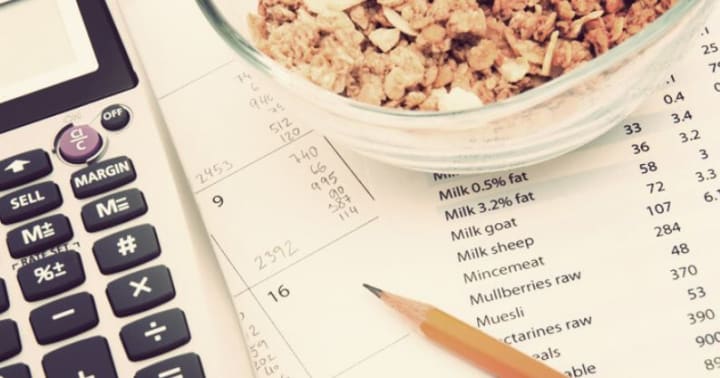Calorie Counting vs Intuitive Eating
Opposing Ends of the Dieting Spectrum

You may know you want to lose a few pounds, but picking a weight-loss method when there is so much conflicting advice, programs and pseudo-science out there is no easy feat.
If we ignore the fad diets (you know, the ones that suggest that you eat nothing but melons every day, unless it's a Wednesday in which case you can eat a whole roast chicken and a jar of peanut butter for "refuelling"), then there are two opposing ways you could potentially approach it.
At one end of the spectrum there is calorie counting, a very controlled measurement of energy in versus energy out, and at the other there is intuitive eating, which is a far more holistic approach involving listening to your body and tuning back into its natural desires.
Here's what you need to know:
Calorie Counting
A calorie is a unit of energy. We consume this energy through the food and drink we consume and we burn it by activity, even the activity you don't actively participate in.
In order for your body to breathe, pump blood through your veins, allow your kidneys to function etc...it needs to burn energy for it. The amount of calories required to do this changes from person to person depending on factors such as height, gender, weight and muscle mass. This is called your Basal Metabolic Rate (BMR).
If your BMR is high (if you have a lot of muscle or carry a lot of weight for instance), you should find it easier to lose weight in the beginning because your BMR will be higher. As you lose weight, your BMR will reduce as well, simply because it requires less energy to keep a lighter body alive.
In addition to the energy you burn simply by living, you also burn calories in exercise. This isn't limited to formal exercise like classes or slogging at the gym. Cleaning, taking a stroll with the dog, gardening or going to the supermarket all count. Anything that makes your body move will burn additional calories.
You can work out a rough indicator of the calories you are likely to require using one of many BMR calculators online, which will also add an assumption of extra calories burnt by your general activity levels.
Once you know how many calories you burn in a day, you can start to calculate how many calories you need to eat in order to lose weight. To do this you must eat less calories than the calories you burn.
1 pound of fat is equal to 3,500 calories.
Once you know this, you can work out the amount of calories you need to eat to lose weight by calculating the following:
- 1lb of fat loss in a week = 500 calorie deficit per day (3,500 a week)
- BMR + calories burnt in exercise = X
- Calories eaten = Y
- If you ensure that X - Y = 500 you should reach your goal of 1lb fat loss a week.
For health reasons it is recommended that you never go below an intake of 1,200 calories per day and 1-2 pounds loss per week is the ideal.
To ensure success, tracking your calorie intake is key! You can do this by using and app, a spreadsheet, or just a note pad and pencil, but it is important to note down every single thing as forgotten calories can soon add up and hinder your success.

With such a black and white view comes a major downside, such as it is very easy to become obsessed. Constant counting and logging of calories can give them disproportional importance in your mind and allow you to fixate or lose your sense of proportion when you exceed your calorie target.
Plus you're hungry and it's hard not to think about that when you're concentrating on monitoring your food intake all day and thinking about what you can't have.
If you are someone who loves tracking numbers or charting progress and you are able to keep a balanced approach to your diet, then calorie counting can be a very effective method of weight loss.
The key is to stick with it, even on weeks when the scales don't move, and have faith in the science of calories in versus calories out overall .
Intuitive Eating
The concept of intuitive eating is to step away from the dieting mindset completely.
It involves making a conscious decision to stop dieting and start eating exactly what you want, when you want to. The only catch is that you really need to listen to your body to find out what and when that is.
When you first start to eat intuitively, it takes a little time for the novelty of being "allowed" to eat something like ice cream for breakfast if you wish to wear off, which can feel really scary for a weary ex-dieter who no longer trusts him or herself around food.
However, going through this stage is an important part of the mindset of trusting that no food is forbidden anymore. You really can have whatever you want whenever you want it forever more.
Once you honestly believe this to be true and trust that you aren't going to restrict yourself again, the ice cream stops looking so tempting first thing in the morning. You reach for it and stop when you realise that it's going to make you feel a bit sick and if you're honest what you actually want is some muesli and a banana.
You can have the ice cream later if you want it. And maybe you will, maybe you won't.
It's important to remember that, despite what you've been told, food has no moral value. Nothing is "good" or "bad," it's just food.
In order to start this way of eating, you need to get back in tune with your natural hunger. It's good practice to keep a journal for a while and score the level of your hunger from zero (faint) to 10 (sick) before and after each meal. You can still eat even if you discover that you aren't hungry, but being able to recognize the hunger level is the key goal.
Once you are more in tune with you appetite, aim to eat when you are around a three or four and stop eating when you are a six or seven, not getting too hungry or too stuffed. If you can't manage a brisk walk after a meal, chances are you've eaten too much.
Weight loss can be quite slow with this approach, but it is a far kinder way of eating for your mental health as you are not tied to certain foods, limited on times of eating or reaching a quota for the day etc...which can be isolating when dieting. Weight that is lost slowly over time also has a far greater likelihood of staying off longer term too.
By listening to your body, you trust it to take you back to the natural weight it wants you to be and this can frustrate some people if they have a body size or shape in mind.
If you are someone who wants to stop thinking about food and diet and let your body do its natural thing, then this is the way of eating for you.
About the Creator
Rachel Roberts
A freelance writer from Coventry, England.
Loves meditation, Sunday afternoon's reading and walking her two whippets in the woods.






Comments
There are no comments for this story
Be the first to respond and start the conversation.